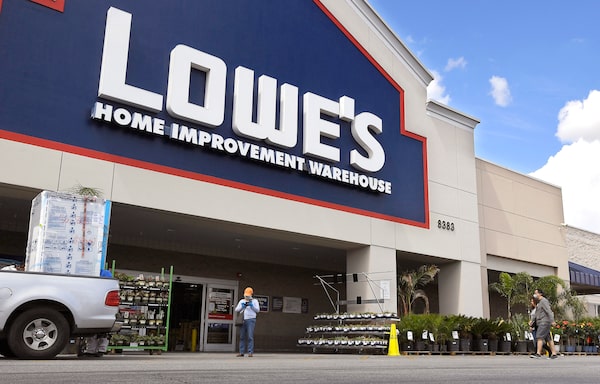
U.S. hardware giant Lowe's has sold its Canadian retail operations, which includes 450 stores, to New York private equity firm Sycamore Partners for US$400-million in cash.Mark J. Terrill/The Associated Press
Getting caught up on a week that got away? Here’s your weekly digest of the Globe’s most essential business and investing stories, with insights and analysis from the pros, stock tips, portfolio strategies and more.
Lowe’s gets rid of Rona and Canadian operations
U.S. hardware giant Lowe’s is selling its Canadian retail operations – about 450 stores that operate under the Lowe’s, Rona, Reno-Depot and Dick’s Lumber banners – after a frustrating six-year run. Nicolas Van Praet reports the buyer is New York private-equity firm Sycamore Partners, which is buying the stores for US$400-million in cash plus unspecified performance-based benefits. Lowe’s entered the Canadian market in 2007 and expanded its footprint in 2016 with the purchase of Rona for $3.2-billion. The sale is a recognition by the company that it couldn’t make the takeover work. The business has struggled and Lowe’s has cut jobs and closed dozens of stores in several provinces. For Rona, the sale will likely mean another period of turbulence as Sycamore tries to improve financials and attract new ownership.
Interest-free student loans among fiscal update highlights
The federal government published its fall economic statement this week, acknowledging what many Canadians are fretting about as they cope with affordability challenges: the increasing odds the country will go into recession. Matt Lundy writes that Ottawa outlined several risks to the economic outlook, including a “more aggressive” reaction to inflation from the U.S. Federal Reserve, via higher interest rates, and “widespread volatility” in markets for stocks and bonds. Among the highlights is the proposal to make all Canada Student Loans and Canada Apprentice Loans interest-free on a permanent basis, including loans currently being repaid. The change, which would start on April 1, 2023, would cost $2.7-billion over five years and slightly more than $550-million a year thereafter.
Sorry retirees, inflation is far from over
One of the greatest threats to a comfortable retirement is inflation, writes Frederick Vetesse. Past waves of high inflation lasted about four years, which suggests the current wave of skyrocketing prices doesn’t seem to have an end in sight.
Employers are hiring more temporary foreign workers to fill low-wage jobs
Canadian companies are ramping up their use of the Temporary Foreign Worker program, after its expansion by the federal government, to fill low-wage jobs to alleviate labour shortages. As Matt Lundy reports, employers received approval in the second quarter of this year to hire about 45,200 positions through the TFW program – the most since at least 2017. The April-to-June quarter tends to be a slower period for approvals, but this past spring was booming: TFW approvals were more than double those of the same period in 2018 and 2019. Companies can now hire up to 20 per cent of their staff through the TFW program’s low-wage stream, up from the previous 10-per-cent cap. And in seven industries with acute labour shortages – such as restaurants, construction and hospitals – the cap was moved to 30 per cent for a year.
The affordability trap of Toronto and Vancouver
Are you a young person living in Toronto or Vancouver? You may want to consider relocating to a less-expensive city. Without six-figure incomes or well-off parents, anyone in their 20s and 30s should question whether they have a future in two of Canada’s biggest cities – that includes home ownership, writes Rob Carrick. It’s a challenge to escape the gravitational pull of these cities, especially during your career-building years, but internal migration patterns within Canada show people have started rebelling against the high cost of living that comes with a Toronto or Vancouver address. According to Statistics Canada, more people left Ontario than moved there in the past year.
Dragons’ Den’s Arlene Dickinson announces ‘super firm’
Veteran financier Arlene Dickinson of Dragons’ Den fame, announced this week that she is merging her marketing and communications firm with five other agencies to launch a larger company with an international reach, backed in part by the Canadian Business Growth Fund. The new company, called Believeco:Partners, will have nearly 300 employees in seven offices across North America, serving clients in a variety of sectors including technology, food, health, agriculture, government and financial services, Temur Durrani reports. It will combine Ms. Dickinson’s agency Venture Play with leading Canadian marketing firms Argyle, Brightworks, Zync, Revolve and Castlemain. “It’s six firms coming together right now, but we definitely have plans to acquire other independent companies in the future,” Ms. Dickinson told The Globe and Mail.
MoneyTok, FinTok, join The Globe on TikTok
The Globe and Mail is now on TikTok, with new personal finance-focused videos posted a couple of times a week, hosted by Michelle da Silva and Mathilde Augustin. Download the app and give us a follow for money tips, career advice, investment ideas and more.
Now that you’re all caught up, prepare for the week ahead with the Globe’s investing calendar.
 Michelle da Silva
Michelle da Silva